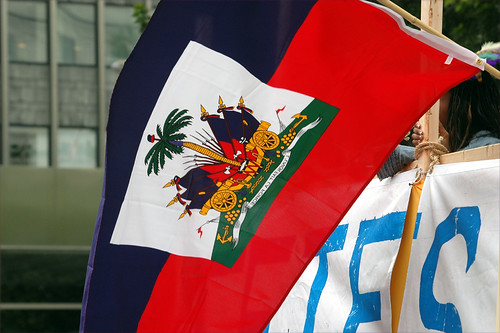This list is intended to provide a guide to recent resources on culture and society in Haiti for people who wish to be better informed themselves about the context in which the recent earthquake and its devastation are occurring. With apologies, most of the journal articles are not public access.
Furthermore, we really encourage everyone to visit InterAction’s Haiti response page, which includes a variety of ways to help out.
 Benoît, C. 2007. “The politics of vodou: AIDS, access to health care and the use of culture in Haiti”. Anthropology in Action 143, 59-68.
Benoît, C. 2007. “The politics of vodou: AIDS, access to health care and the use of culture in Haiti”. Anthropology in Action 143, 59-68.
Coreil, J. & Mayard, G. 2006. “Indigenization of illness support groups in Haiti”. Human Organization 652, 128-139.
Curci, S. 2008. “Mapping Haitian history: a photo essay”. Journal of Haitian Studies 142, 120-30.
Farmer, P. 2004. “An anthropology of structural violence.” Current Anthropology 453, 305-325.
Farmer, P. E. 2001. “The consumption of the poor: tuberculosis in the 21st century.” Ethnography 12, 183-216.
Farmer, Paul. 1992. AIDS and Accusation: Haiti and the Geography of Blame. Berkeley: University of California Press.
Farmer, P. E. 2008. “Mother courage and the future of war.” Social Analysis 522, 165-184.
Giafferi, N. 2004. The violence of relations in fieldwork: the Haitian example. Terrain 43, 123-40, 159.
Guilbaud, P., & Preston, M. 2006. “Healthcare assessment study in Les Cayes, Haiti: towards a framework for rural capacity development and analysis”. Journal of Haitian Studies 122, 48-69.
Hastings, A. 2007. “Eradicating global poverty: is it really achievable?” Journal of Haitian Studies 132, 120-134.
James, E. C. 2004. “The political economy of “trauma” in Haiti in the democratic era of insecurity”. Culture, Medicine and Psychiatry 282, 127-149.
James, E. C. 2009. “Neomodern insecurity in Haiti and the politics of asylum”. Culture, Medicine and Psychiatry 331, 153-159.
James, E.C. 2010. “Ruptures, rights, and repair: the political economy of trauma in Haiti”. Social Science and Medicine 70, 106-113.
Johnson, P. C. 2005. “Three paths to legal legitimacy: African diaspora religions and the state”. Culture and Religion 61, 79-105.
Kovats-Bernat, C. 2006. “Factional terror, paramilitarism and civil war in Haiti: the view from Port-au-Prince”, 1994-2004. Anthropologica New Series 481, 117-139.
Kovats-Bernat, J. C. 2002. “Negotiating dangerous fields: pragmatic strategies for fieldwork amid violence and terror”. American Anthropologist 1041, 208-222.
Laguerre, M. S. 2005. “Homeland political crisis, the virtual diasporic public sphere and diasporic politics“. Journal of Latin American Anthropology 101, 206-225.
Landry, T. R. 2008. “Moving to learn: Performance and learning in Haitian vodou”. Anthropology and Humanism 331/2, 66-84.
Maglorie, G. & Yelvington, K. A. 2005. “Haiti and the anthropological imagination”. Gradhiva 1, 109-452.
Martin, P., Midgley, E. & Teitelbaum, M. S. 2002. “Migration and development: Whither the Dominican Republic and Haiti?” International Migration Review 362, 546-569.
Maternowska, M. C. 2000. “Clinic in conflict: A political economy case study of family planning in Haiti”. Contraception Across Cultures: Technologies, Choices, Constraints, 103-126.
Matory, J. L. 2007. “Free to be a slave: Slavery as metaphor in the Afro-Atlantic religions”. Journal of Religion in Africa 373, 398-425.
Raphael, D., Delisle, H. & Vilgrain, C. 2005. “Households with undernourished children and overweight mothers: is this a concern for Haiti?” Ecology of Food and Nutrition 442, 147-165.
Richman, K. E. 2007. “Peasants, migrants and the discovery of African traditions: ritual and social change in lowland Haiti”. Journal of Religion in Africa 373, 371-397.
Richman, K. E. 2008. “A more powerful sorcerer: Conversion, capital and Haitian transnational migration”. New West Indian Guide 821/2, 3-45.
Richman, K. & Rey, T. 2009. Congregating by cassette: recording and participation in transnational Haitian religious rituals. International Journal of Cultural Studies 12, 122, 149-166.
Schuller, M. 2007. “Invasion or infusion? understanding the role of NGOs in contemporary Haiti”. Journal of Haitian Studies 132, 96-119.
Schuller, M. 2007. Seeing like a “failed” NGO: globalization’s impacts on state and civil society in Haiti. PoLAR: Political and Legal Anthropology Review, 301, 67-89.
Schwartz, T. T. 2003. “Children are the wealth of the poor:” pronatalism and the economic utility of children in Jean Rabel, Haiti. Research in Economic Anthropology 22, 61-105.
Shillam, R. 2008. “What the Haitian revolution might tell us about development, security, and the politics of race”. Comparative Studies in Society and History 503, 778-808.
Smith, Jennie M. 2001. When the Hands Are Many: Community Organization and Social Change in Rural Haiti. Ithaca: Cornell University Press.
Smith, M. J. 2007. “From Dessalines to Duvalier revisited: a quarter century retrospective”. Journal of Haitian Studies 131, 27-39.
Thylefors, M. 2008. “‘Modernizing god’ in Haitian vodou? : reflections on olowoum and reafricanization in Haiti”. Anthropos 1031, 113-125.
Vonarx, N. 2007. “Vodou, illness and models in Haiti: from local meanings to broader relations of domination”. Anthropology in Action 143, 18-29.
Ward, B., Lee, J. E., & Sung, J. H. 2007. “Using data hierarchies to identify health disparities geographically”. Practicing Anthropology 294, 29-33.
Wolff Benjamin, G. 2007. “Encouragement, consequences, honor, respect: empowering parents to transition successfully to a democratic culture”. Journal of Haitian Studies 132, 39-57.
Image: “Haiti,” from Flickr user caribb, Creative Commons.


No comments:
Post a Comment